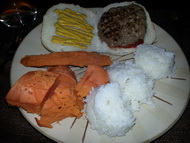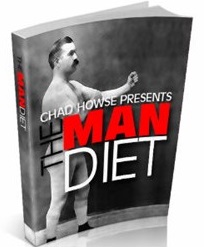![]()
 Just like sporadic fasting, carb backloading has exponentially risen in popularity in the last couple of years. The pitch is very alluring and according to the carb backloading’s main supporter, John Kiefer, one can pretty much lose fat and build muscles while indulging their favorite sugary carbs every day using this use this unusual style of eating.
Just like sporadic fasting, carb backloading has exponentially risen in popularity in the last couple of years. The pitch is very alluring and according to the carb backloading’s main supporter, John Kiefer, one can pretty much lose fat and build muscles while indulging their favorite sugary carbs every day using this use this unusual style of eating.
Yes, I agree it sounds pretty awesome, but is there any truth to it and is the carb backloading really better that the traditional eating? Well let’s find out.
If you are not yet familiar with carb backloading, it is pretty simple:
You get to eat light during the mornings, which includes skipping breakfast, and early afternoon hours, and then eats slightly heavier at night.
You eat little or no carbs until you’re done with workout, which should be later in the afternoon. The carb intake should begin with the post-workout meal and continues throughout the rest of the evening. According to the author, John Kiefer, who is ideally the most well known supporter if the carb backloading( but not the creator) says that this kind of dieting takes advantage of the daily changes in insulin sensitivity in fat and muscle cells, in addition to the exercise induced increase in the sensitivity of insulin in muscle cells.
Research has it that insulin sensitivity in both fat and muscle cells is higher in the morning than in the evening and this means that the cells will be more receptive to glucose in the early hours. This however, is good for the muscle cells, as the more glucose absorbed in the muscles, the better the performance during workouts. But ideally it is bad for the fat cells as the more glucose is absorbed in fat cells, the more there cases of fat storage.
The main idea of carb backloading is for one to use these mechanisms to their advantage by not consuming carbs when the body is most capable of storing them as fast. Instead, one should take them when their bodies are most likely to store them in forms of glycogen in the muscles which is later during the day, after a workout session.
The post workout part is very important: the individual has to use weightlifting in the day so that they can deplete the glycogen stored and ideally increase the insulin sensitivity in the muscle cells, but not in the fat cells. So, when eventually when they start eating carbs, their body preferentially takes them to the muscle cells and not in the fat cells .
That is the entire theory backing up the carb backloading. And while it may sound pretty cutting edge and John listing dozens of studies to back up his ideas, carb backloading is not all it’s said be. But before we can look at that, let us briefly look at the positive side of carb backloading.
Carb backloading essentially helps to break the mainstream dietary trance.
Individuals stuck in the festering swamp of dietary programs that claim to be very effective are mislead to thinking that losing weight is way trickier than it really is. Instead of being told the raw truth behind weight loss, they are lead into wasting money on scams and ineffective products that are principled around fasting, food restriction and weight loss pills.
With carb backloading, one can escape this terrible ordeal that seems to never go away. When we talk of body composition, what and when you eat is nearly as important as how much you consume.
My take is carb backloading can pretty much enhance people’s lifestyles and they might as well enjoy a day’s worth of carbs. After all, no one would really much enjoy eating carbs the whole day…



 OneCareNow is a general weblog that was created by several writers with a specific goal in mind: To offer one place that covers important topics which people really care about.
OneCareNow is a general weblog that was created by several writers with a specific goal in mind: To offer one place that covers important topics which people really care about.![Back Pain Breakthrough by Palmer & Dr. Young [2024 Review]](https://www.onecarenow.org/wp-content/uploads/2021/02/Back-Pain-Breakthrough-Young-Amy-50x50.png)
![Vincent’s Midas Manifestation System Review [Updated 2024]](https://www.onecarenow.org/wp-content/uploads/2021/02/Midas-Manifestation-50x50.png)
![The NEW Happiness Code by David [Updated 2024 Review]](https://www.onecarenow.org/wp-content/uploads/2021/01/The-NEW-Happiness-Code-50x50.png)
![Michael Christianson’s Manifestation Sigil Review [2024]](https://www.onecarenow.org/wp-content/uploads/2021/01/Manifestation-Sigil-50x50.png)
